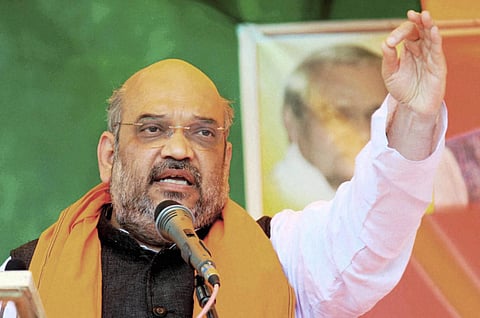Despite the political rumble beef is back on the menu
The divisive politics of Gujarat will simply not wash in Kerala

Notwithstanding the political rumble, beef curry is back on the menu at the Kerala House in Delhi. “A million mutinies”, said Naipaul, when writing on India in the 1990s. He was prophetic, for in Prime Minister Narendra Modi’s India, we have insurrections every day, a fracas on beef today while yesterdays are full of wars on culture, history and identity. Indeed, who an Indian is and what he should eat, read, watch and even joke about is under scrutiny; the very Indian-ness that has gradually evolved over the last six decades is under threat.
Arun Jaitely, the country’s finance minister, proclaims these are manufactured controversies, yet far from the madding crowds, what is the impact of these beef wars on Kerala’s upcoming civic polls? Is it a manufactured slugfest to vitiate the elections, because the somnolent Police Commissioner of Delhi reacted with unusual alacrity? He sent a posse of 30 men to stop not a rape, a murder or a terrorist act but to inspect if the meat from a slaughtered cow was being eaten in a state government canteen. Holy cow, the ludicrousness is simply staggering! In this theatre of the absurd and lost in the insidious din, is the exceptionalism of Kerala. The divisive politics of Gujarat will simply not wash here. West Bengal frequently compared with Kerala in such discussions is different; the demographics are vastly dissimilar and so are the key social forces.
Kerala has a population that is 15 per cent Muslim — an influential and voluble minority — and 18 per cent Christians — equally active and vociferous — and the Hindu majority is variegated; consisting of Nairs, Ezhavas, Pulayas, Brahmins and a variety of other castes. But in this piebald Hindu population of 54.7 per cent, the Eshavas, once looked down upon by the erstwhile dominant Nairs constitute over 20 per cent, making it the single largest community within Kerala.
The Left parties, E. M.S Namboodripad, K. Kelappan, the Kerala Gandhi; Mannathu Padmanabhan; Swathi Thirunal, the last Maharaja of the princely state of Travancore; and a host other social reformers — some dating back to the 1850s — have all made major contributions to change the embedded feudal structure of Malayali society. But none stands as tall as Narayana Guru and no caste-based organisation in Kerala has done more for social reform than the trust formed in his honour called the Sree Narayana Dharma Paripalana, popularly referred to as SNDP. Indeed, the temple entry proclamation of 1936, a milestone for the country, owes much to this extraordinary reformer and Gandhi himself paid rich tribute to him and to the Maharaja who issued the declaration.
A shadow of its former self
The SNDP was the vanguard for change, sadly no longer so; it is a pale shadow of its former self. And the current head of the trust, Vellapally Natesan, is not worthy of the august position he occupies. Natesan’s rise to fame started some 20 years ago and his journey from a bar owner to becoming a powerful voice in Kerala politics is the stuff of legend that can be found only in an India of a million mutinies. Indeed the Natesan story fits well with Modi’s India and is closely linked to the BJP’s attempts to carve a niche out for itself in the state.
In 1996, Natesan, a nobody, was signed up by an influential group of insiders of the SNDP to foil BJP’s attempts to take control of the trust. Ironically it is the very same Natesan 20 years hence who has joined the BJP and turned Kerala politics on its head. The SNDP traditionally has always supported either the Congress or the Left in Kerala. But BJP’s Amit Shah has allegedly promised Natesan the moon should he break the stronghold of the Left and the Congress-led coalitions.
If so, undoubtedly the beef fracas at the Kerala House is a deliberate tactic that has the tell-tale marks of an Amit Shah strategy — polarising voters just before the elections to aggregate the Hindu vote bank — but the question is: Has this ploy gone sour? Because the local BJP chief in Kerala has quickly distanced himself from this controversy.
The BJP think-tank has misread Kerala. Amit Shah succeeded to an extent in West Bengal, traditionally a non-BJP stronghold like Kerala, and was hoping to replicate that success, but that has misfired. They made inroads in West Bengal because the Left and the TMC vacated space due to legacy issues and misgovernance. Besides, the Hindu right has always had a kernel of supporters of stalwarts such as Shyama Prasad Mukherjee to keep its Hindu vote bank intact. Kerala has never had a similar tradition. There is, however, one other simple, yet bizarre explanation. The ongoing Bihar election was the trigger for the beef slugfest in Delhi and Kerala just happened to be collateral damage. If so, the BJP chief has scant regard for Kerala and with his recent remarks conflating the results in the Bihar elections with Pakistan, it would appear he neither knows his Bihar nor his India.
Therefore, let no one in the BJP ask, even in half jest, ‘Where’s the beef?’ in this manufactured mess?
Ravi Menon is a Dubai-based writer, working on a series of essays on India and on a public service initiative called India Talks.
Sign up for the Daily Briefing
Get the latest news and updates straight to your inbox



